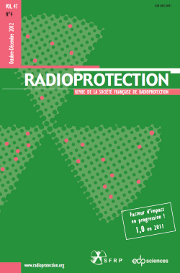Article contents
Implants médicaux et champs électromagnétiques basses fréquences 0–100 kHz
Published online by Cambridge University Press: 17 July 2014
Abstract
Présents dans notre environnement les rayonnements électromagnétiques (EM) suscitent de multiples questions quant à leurs effets potentiels pour les porteurs de dispositifs médicaux actifs implantés (DMAI). Le nombre croissant de porteurs d’implants médicaux, y compris dans la population active, a entraîné un questionnement quant à leur comportement en présence d’un champ EM. L’interaction entre le corps humain et les champs EM reste complexe et dépend de multiples facteurs tels que la fréquence, la puissance et la modulation des champs. Nous présentons ici une revue de cette problématique dans le cas des champs EM basse fréquence.
Keywords
- Type
- Article
- Information
- Copyright
- © EDP Sciences, 2014
References
Références
- 1
- Cited by


